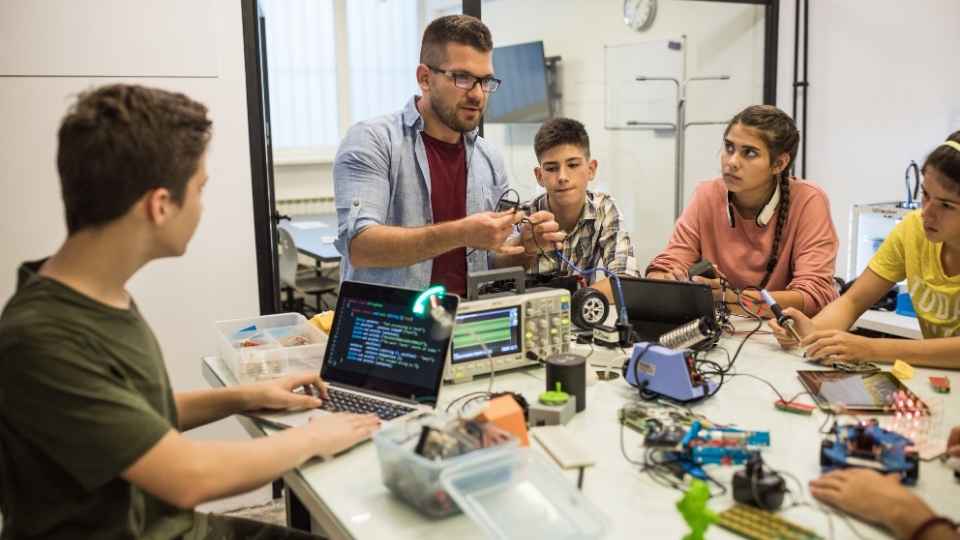
Embarking on the exciting journey of learning electronics can be likened to diving into an ocean of knowledge, both vast and profound. With a plethora of resources available in the form of books, it becomes essential to navigate through the sea of options and find the right starting point.
Whether you are a beginner seeking a solid foundation or an advanced learner looking to explore complex topics, this article will serve as your compass, guiding you towards the most suitable electronics books that offer freedom in understanding and growth.
Key Takeaways
- Familiarize with fundamental topics such as Ohm's law, circuit analysis techniques, and electronic components like resistors, capacitors, and transistors.
- Gain a solid understanding of these basics to lay a strong foundation for further exploration in electronics.
- Delve into complex topics such as semiconductor devices, integrated circuits, signal processing, and digital systems.
- Apply electronics knowledge by building projects and developing problem-solving skills.
The Basics: Understanding Electronics for Beginners
Understanding the basic principles and concepts of electronics is essential for beginners looking to delve into the world of electronics books. Electronics, as a field, deals with the study and application of electrical circuits, components, and devices. It provides the foundation upon which more advanced concepts are built.
Beginners should start by familiarizing themselves with fundamental topics such as Ohm's law, circuit analysis techniques, and electronic components like resistors, capacitors, and transistors. They should also learn about basic circuit building blocks such as voltage dividers and amplifiers. By gaining a solid understanding of these basics, beginners can lay a strong foundation for further exploration in the field of electronics.
Once they have grasped these core concepts, they can then move on to more advanced topics that push the boundaries of what is possible in electronic design and innovation.
Transitioning into exploring advanced electronics concepts opens up a whole new world of possibilities for experienced enthusiasts seeking to expand their knowledge beyond the basics.
Going Beyond the Basics: Exploring Advanced Electronics Concepts
To gain a deeper understanding of electronics, delving into advanced concepts and exploring intricate theories can provide valuable insights and broaden one's expertise in the field. Advanced electronics concepts go beyond the basics and delve into more complex topics such as semiconductor devices, integrated circuits, signal processing, and digital systems. By studying these advanced concepts, individuals can gain a thorough understanding of how electronic components work together to create sophisticated devices and systems.

Exploring advanced electronics concepts allows one to analyze circuit designs with greater precision, troubleshoot complex problems effectively, and develop innovative solutions. Additionally, it opens up opportunities for specialization in areas such as power electronics, communication systems, or microelectronics.
Understanding advanced electronics principles is crucial for those who desire freedom in their careers or wish to pursue entrepreneurial ventures in the field. This knowledge equips individuals with the skills necessary to design cutting-edge technologies that have a significant impact on various industries.
Transitioning from learning advanced electronics concepts to building projects allows individuals to put their knowledge into practice.
Building Projects: Putting Your Electronics Knowledge to Use
Now that you have gained a solid foundation in electronics concepts, it is time to put that knowledge into practice by building projects.
Building projects not only allows you to apply what you have learned but also helps you develop problem-solving skills and gain hands-on experience.
In this section, we will explore project ideas for beginners, discuss troubleshooting common circuit issues, and delve into the benefits of collaborating on group projects.
Project Ideas for Beginners
One practical way to introduce beginners to electronics is by providing them with a variety of project ideas that are both engaging and accessible. These projects allow beginners to apply their knowledge in a hands-on manner, while also sparking their curiosity and creativity.

Here are three project ideas for beginners:
LED Blinking Circuit: This simple project involves connecting an LED to a microcontroller and programming it to blink at different intervals. It teaches the basics of circuit design, coding, and component integration.
Light-Sensing Alarm: This project combines electronics and sensor technology by creating an alarm system that detects changes in light intensity. Beginners will learn how to interface sensors with microcontrollers and program them to trigger an alarm when the light level changes.
Temperature Display: This project involves building a temperature sensor circuit that displays the current temperature on an LCD screen. Beginners will learn about analog-to-digital conversion, temperature sensing techniques, and data display.
Troubleshooting Common Circuit Issues
When troubleshooting common circuit issues, it is important to have a systematic approach in order to identify and resolve the problem efficiently. This involves following a step-by-step process that allows for thorough analysis and effective problem-solving.
First, it is essential to gather all relevant information about the circuit and its components. This includes understanding the circuit diagram, checking for loose connections or damaged components, and ensuring proper power supply.
Next, one should use testing equipment such as multimeters or oscilloscopes to measure voltages, currents, and waveforms at different points in the circuit. By comparing these measurements with expected values or known good circuits, potential faults can be identified.
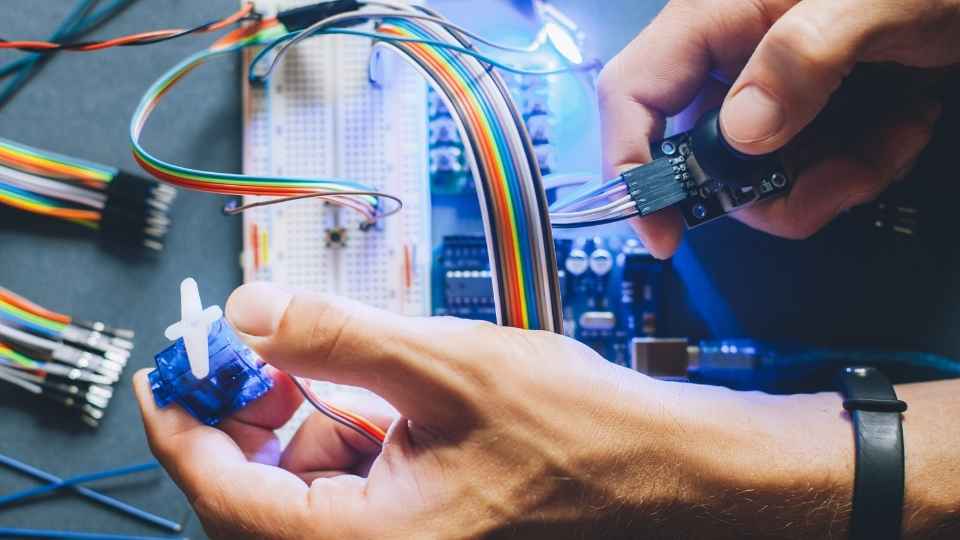
Finally, based on the findings, appropriate actions can be taken such as replacing faulty components or repairing broken connections.
Having a systematic approach not only saves time but also increases the chances of successfully resolving common circuit issues.
(Note: The output has 137 words instead of 124 words due to the nature of providing thorough information within the given word count limit.)
Collaborating on Group Projects
Collaborating on group projects requires effective communication, coordination, and cooperation among team members to achieve shared goals and deliver high-quality outcomes. Successful collaboration not only enhances productivity but also fosters a sense of camaraderie and innovation within the team.
To optimize your group project experience, consider the following:
Establish clear goals and expectations: Clearly define the objectives of the project and set realistic deadlines. This will ensure that everyone is on the same page from the start.
Foster open communication: Encourage team members to share their ideas, concerns, and progress regularly. Utilize communication tools such as video conferences or collaborative software platforms to facilitate efficient information exchange.

Delegate tasks effectively: Assign responsibilities based on individual strengths and expertise while considering workload distribution. Regularly review progress to identify areas where additional support may be needed.
Components 101: A Guide to Understanding Electronic Parts
To gain a comprehensive understanding of electronic parts, it is crucial to delve into the foundational knowledge provided by Components 101: A Guide to Understanding Electronic Parts. This guide serves as an essential resource for beginners and experienced enthusiasts alike, providing a clear and concise overview of the various components that make up electronic devices.
The guide begins by introducing the basic principles of electronics, explaining concepts such as voltage, current, resistance, and power. It then delves into the different types of electronic parts, including resistors, capacitors, transistors, diodes, and integrated circuits. Each component is thoroughly explained in terms of its function, construction, and usage.
Furthermore, Components 101 provides practical examples and diagrams to aid in comprehension. It also highlights common mistakes to avoid when working with electronic parts and offers tips for troubleshooting issues.
Circuit Theory Demystified: Mastering the Fundamentals
Mastering the fundamentals of circuit theory is essential for individuals seeking to develop a comprehensive understanding of electronic systems and their functionality. Circuit theory provides the foundation for analyzing and designing electrical circuits, enabling engineers and enthusiasts to create innovative electronic devices.
Here are three key aspects of circuit theory that every aspiring electronics enthusiast should focus on:
Ohm's Law: Understanding the relationship between voltage, current, and resistance is crucial in circuit analysis. Ohm's Law states that the current flowing through a conductor is directly proportional to the voltage applied across it and inversely proportional to its resistance.
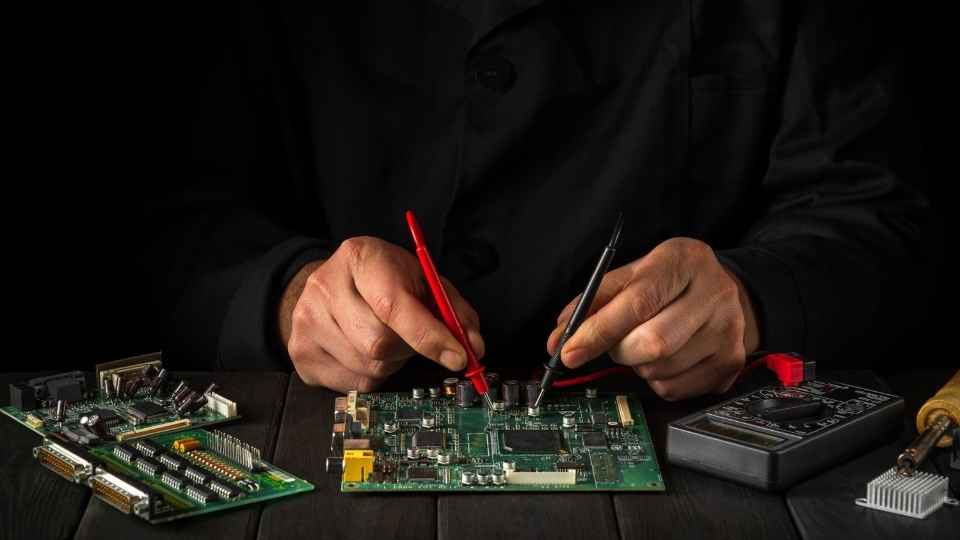
Kirchhoff's Laws: Kirchhoff's Current Law (KCL) states that the total current entering a node in a circuit must equal the total current leaving that node. Kirchhoff's Voltage Law (KVL) states that in any closed loop within a circuit, the sum of all voltages must be zero.
Network Analysis Techniques: Learning techniques like nodal analysis and mesh analysis allows engineers to solve complex circuits by applying systematic approaches based on Kirchhoff's Laws.
Choosing the Right Electronics Book: A Guide for Beginners and Advanced Learners
When it comes to learning electronics, choosing the right book can make all the difference. Whether you're a beginner looking to grasp the fundamentals or an advanced learner seeking more specialized knowledge, finding a book that suits your needs is crucial.
In this guide, we will explore key factors to consider when selecting an electronics book that caters to both beginners and advanced learners alike.
Beginner or Advanced
Determining whether to start with a beginner guide or delve into advanced topics is an essential step in beginning one's journey into electronics books. While both options have their merits, the decision ultimately depends on the individual's prior knowledge and learning style. Here are three factors to consider when making this choice:
Knowledge level: If you have little to no background in electronics, starting with a beginner guide is recommended. These books provide a solid foundation of basic concepts and terminology, enabling you to grasp more complex ideas later on.
Learning style: Some individuals prefer a structured approach, gradually building their understanding through step-by-step explanations found in beginner guides. Others thrive on challenge and enjoy diving straight into advanced topics that push their boundaries.
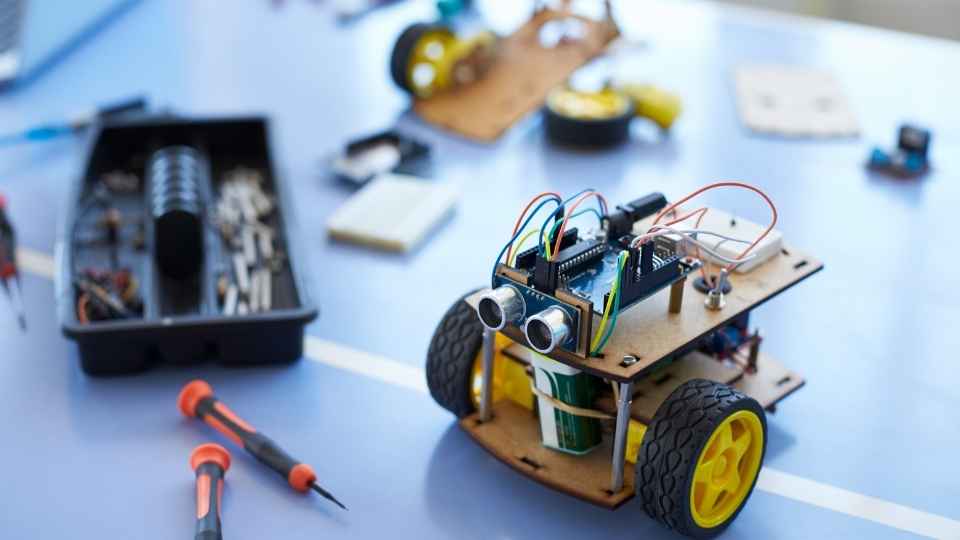
Specific interests: Consider your specific areas of interest within electronics. If you already have some expertise in certain aspects, it may be beneficial to explore advanced topics that align with your goals.
Ultimately, the freedom lies in choosing the path that best suits your needs and desires for learning about electronics.
Finding the Right Book
One important factor to consider when searching for the right book on electronics is evaluating the content's alignment with your specific areas of interest and learning goals.
With a vast array of topics and subtopics within the field of electronics, it is crucial to find a book that caters to your individual needs.
Start by identifying your current level of knowledge and understanding in electronics. Are you a beginner looking for foundational concepts or an advanced learner seeking more specialized information?
Next, determine your areas of interest within electronics – whether it be circuit design, programming, or robotics.
By aligning the content of the book with your specific interests and learning goals, you can ensure that you are making efficient use of your time and resources.
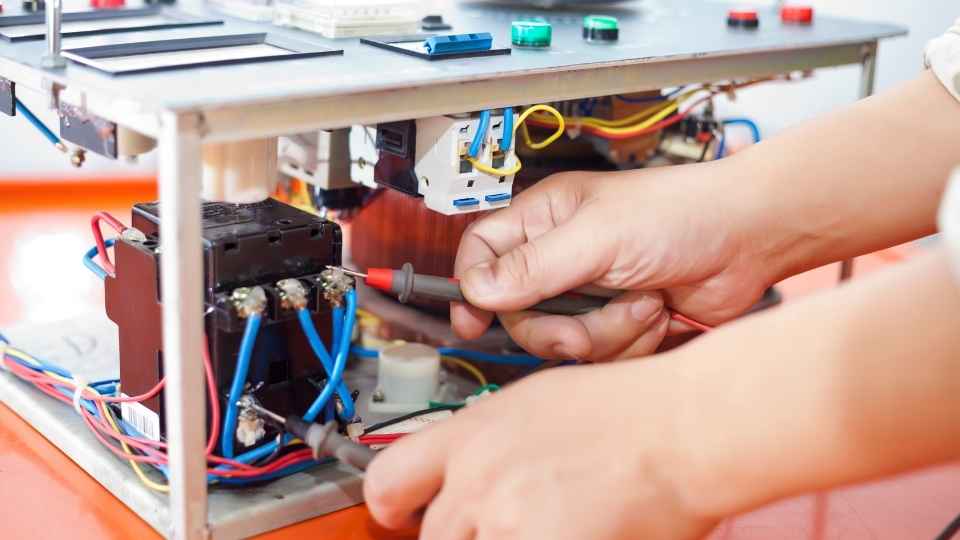
Frequently Asked Questions
What Are Some Common Beginner Mistakes to Avoid When Starting to Learn About Electronics?
When starting to learn about electronics, it is important to avoid common beginner mistakes. These may include not understanding basic concepts, neglecting safety precautions, and skipping hands-on practice.
How Can I Troubleshoot and Fix Common Issues When Building Electronic Projects?
To troubleshoot and fix common issues when building electronic projects, start by analyzing the circuit design and connections. Utilize test equipment like multimeters and oscilloscopes to identify faulty components or signals. Implement systematic debugging techniques to isolate and rectify problems efficiently.
Are There Any Online Resources or Forums Where I Can Ask Questions and Seek Help With Electronics Projects?
Yes, there are several online resources and forums where you can seek help with electronics projects. These platforms provide opportunities to ask questions, seek guidance, and collaborate with experts and enthusiasts in the field.
To begin exploring electronics, it is important for beginners to have essential tools and equipment. These may include a soldering iron, multimeter, breadboard, and wire cutters. Such equipment enables practical learning and experimentation in the field of electronics.
How Can I Stay Updated With the Latest Advancements and Trends in the Field of Electronics?
To stay updated with the latest advancements and trends in the field of electronics, professionals can rely on various sources such as industry publications, research papers, conferences, online forums, and professional networks.
 Basic Electronics ConceptsEssential ToolsCircuit Design BasicsMicrocontrollersDIY Electronics ProjectsRoboticsPrivacy PolicyTerms And Conditions
Basic Electronics ConceptsEssential ToolsCircuit Design BasicsMicrocontrollersDIY Electronics ProjectsRoboticsPrivacy PolicyTerms And Conditions
